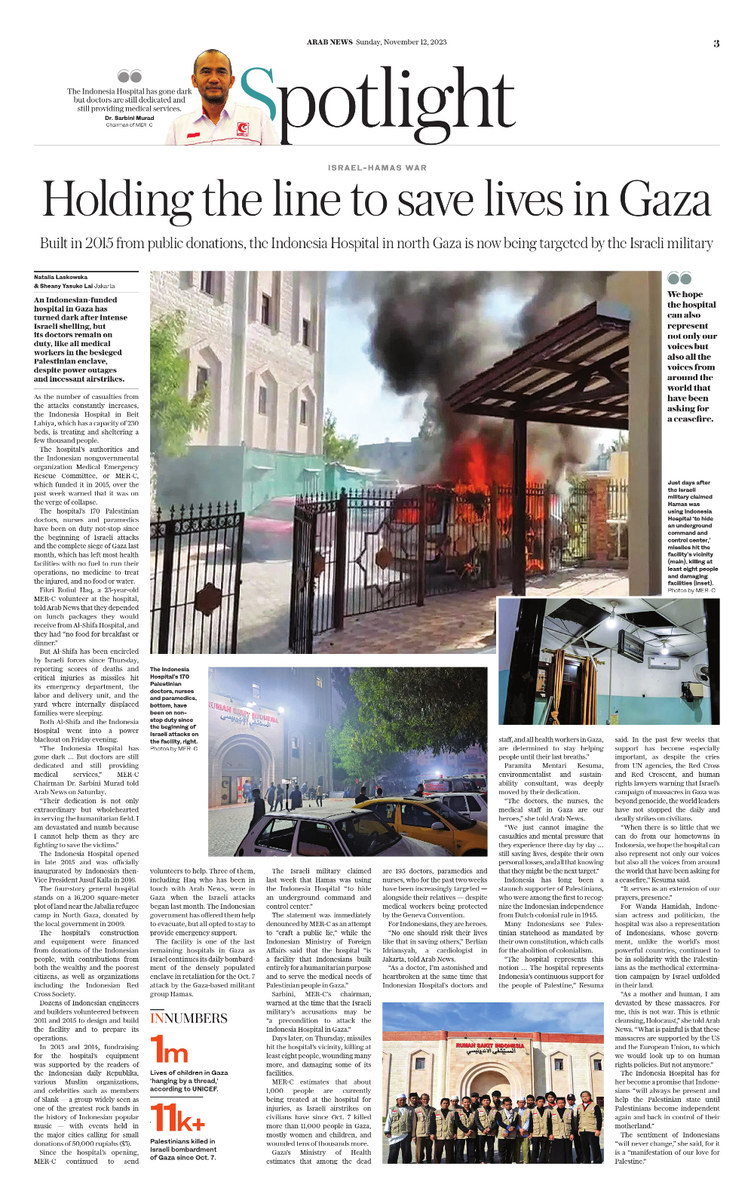JAKARTA: An Indonesian-funded hospital in Gaza has turned dark after intense Israeli shelling, but its doctors remain on duty, like all medical workers in the besieged Palestinian enclave, despite power outages and incessant airstrikes.
As the number of casualties from the attacks constantly increases, the Indonesia Hospital in Beit Lahiya, which has a capacity of 230 beds, is treating and sheltering a few thousand people.
The hospital’s authorities and the Indonesian nongovernmental organization Medical Emergency Rescue Committee, or MER-C, which funded it in 2015, over the past week warned that it was on the verge of collapse.
The hospital’s 170 Palestinian doctors, nurses and paramedics have been on duty not-stop since the beginning of Israeli attacks and the complete siege of Gaza last month, which has left most health facilities with no fuel to run their operations, no medicine to treat the injured, and no food or water.
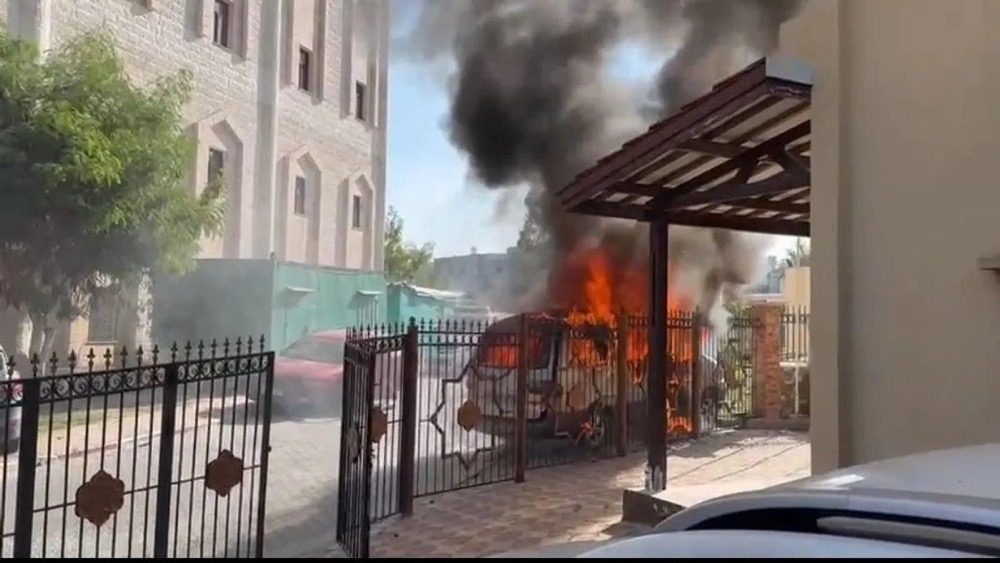
A vehicle on fire outside the Indonesian Hospital in Gaza. (MER-C)
Fikri Rofiul Haq, a 23-year-old MER-C volunteer at the hospital, told Arab News that they depended on lunch packages they would receive from Al-Shifa Hospital, and they had “no food for breakfast or dinner.”
But Al-Shifa has been encircled by Israeli forces since Thursday, reporting scores of deaths and critical injuries as missiles hit its emergency department, the labor and delivery unit, and the yard where internally displaced families were sleeping.
Both Al-Shifa and the Indonesia Hospital went into a power blackout on Friday evening.
“The Indonesia Hospital has gone dark … But doctors are still dedicated and still providing medical services,” MER-C Chairman Dr. Sarbini Murad told Arab News on Saturday.
“Their dedication is not only extraordinary but wholehearted in serving the humanitarian field. I am devastated and numb because I cannot help them as they are fighting to save the victims.”
The Indonesia Hospital opened in late 2015 and was officially inaugurated by Indonesia’s then-Vice President Jusuf Kalla in 2016.
The four-story general hospital stands on a 16,200 square-meter plot of land near the Jabalia refugee camp in North Gaza, donated by the local government in 2009.
The hospital’s construction and equipment were financed from donations of the Indonesian people, with contributions from both the wealthy and the poorest citizens, as well as organizations including the Indonesian Red Cross Society.
Dozens of Indonesian engineers and builders volunteered between 2011 and 2015 to design and build the facility and to prepare its operations.
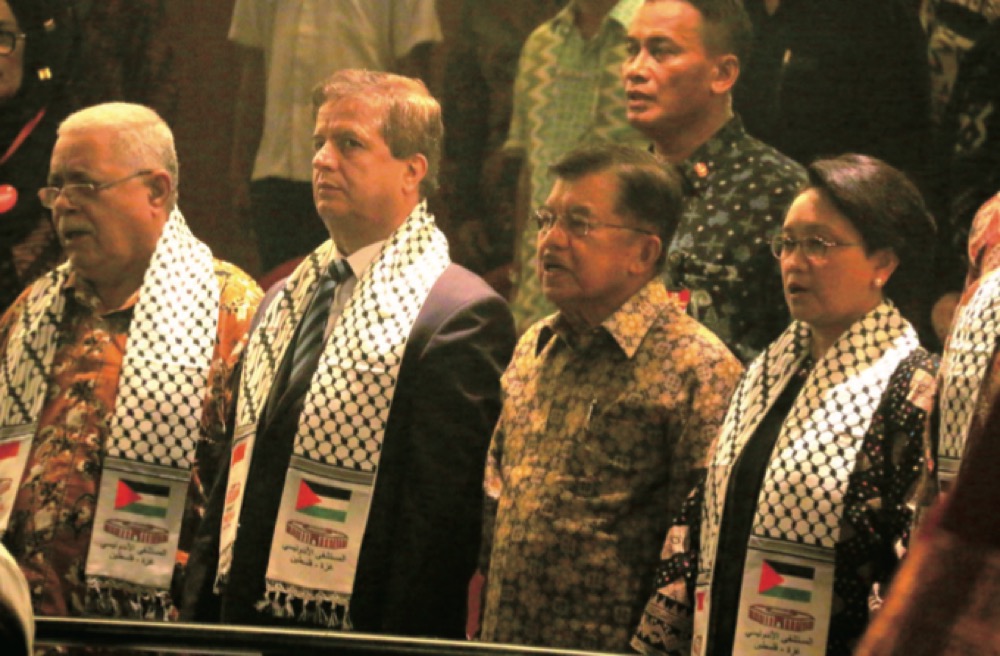
The Indonesia Hospital opened in late 2015 and was officially inaugurated by Indonesia’s then-Vice President Jusuf Kalla in 2016. (MER-C/File)
In 2013 and 2014, fundraising for the hospital’s equipment was supported by the readers of the Indonesian daily Republika, various Muslim organizations, and celebrities such as members of Slank — a group widely seen as one of the greatest rock bands in the history of Indonesian popular music — with events held in the major cities calling for small donations of 50,000 rupiahs ($3).
Since the hospital’s opening, MER-C continued to send volunteers to help. Three of them, including Haq who has been in touch with Arab News, were in Gaza when the Israeli attacks began last month. The Indonesian government has offered them help to evacuate, but all opted to stay to provide emergency support.
The facility is one of the last remaining hospitals in Gaza as Israel continues its daily bombardment of the densely populated enclave in retaliation for the Oct. 7 attack by the Gaza-based militant group Hamas.
The Israeli military claimed last week that Hamas was using the Indonesia Hospital “to hide an underground command and control center.”
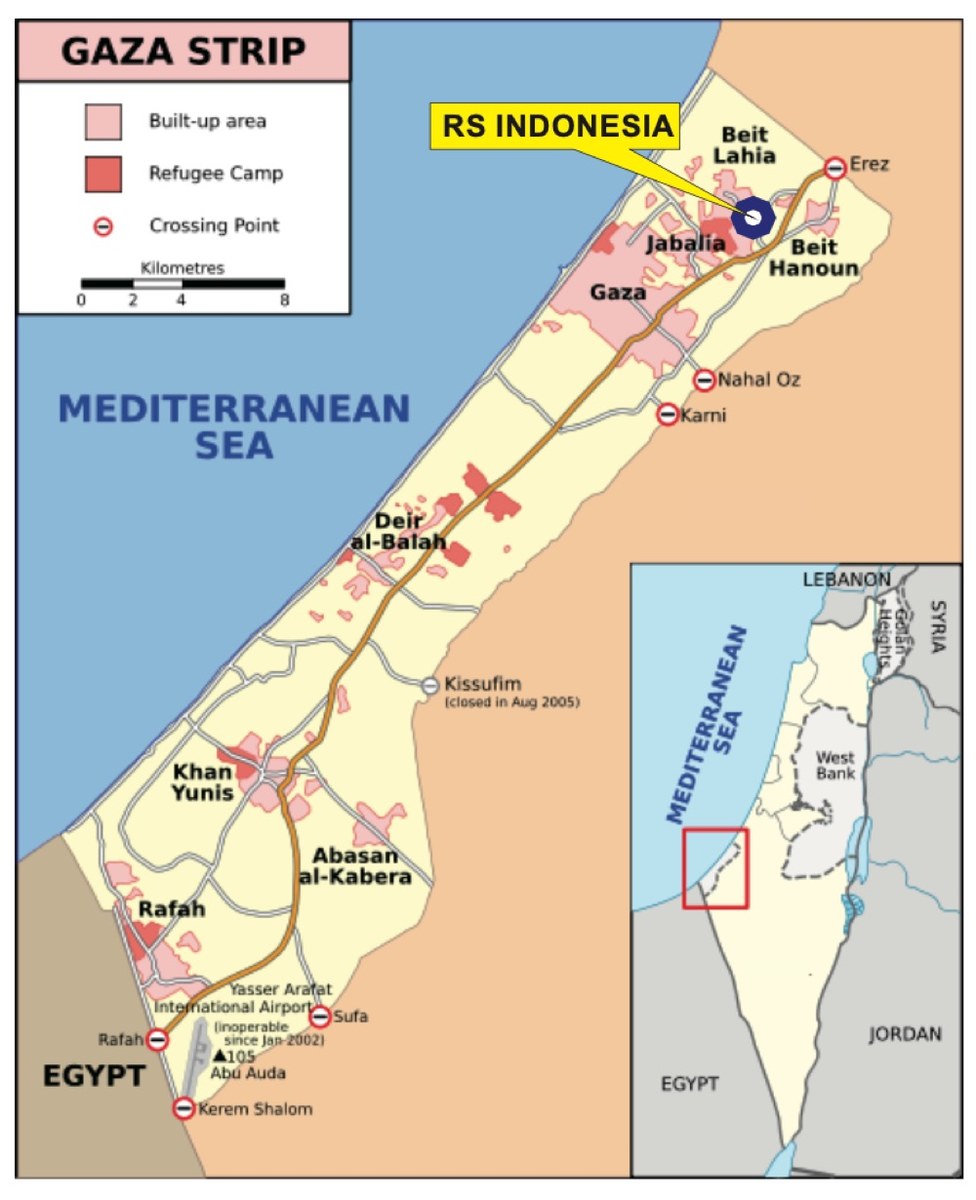
The statement was immediately denounced by MER-C as an attempt to “craft a public lie,” while the Indonesian Ministry of Foreign Affairs said that the hospital “is a facility that Indonesians built entirely for a humanitarian purpose and to serve the medical needs of Palestinian people in Gaza.”
Sarbini, MER-C’s chairman, warned at the time that the Israeli military’s accusations may be “a precondition to attack the Indonesia Hospital in Gaza.”
Days later, on Thursday, missiles hit the hospital’s vicinity, killing at least eight people, wounding many more, and damaging some of its facilities.
MER-C estimates that about 1,000 people are currently being treated at the hospital for injuries, as Israeli airstrikes on civilians have since Oct. 7 killed more than 11,000 people in Gaza, mostly women and children, and wounded tens of thousands more.
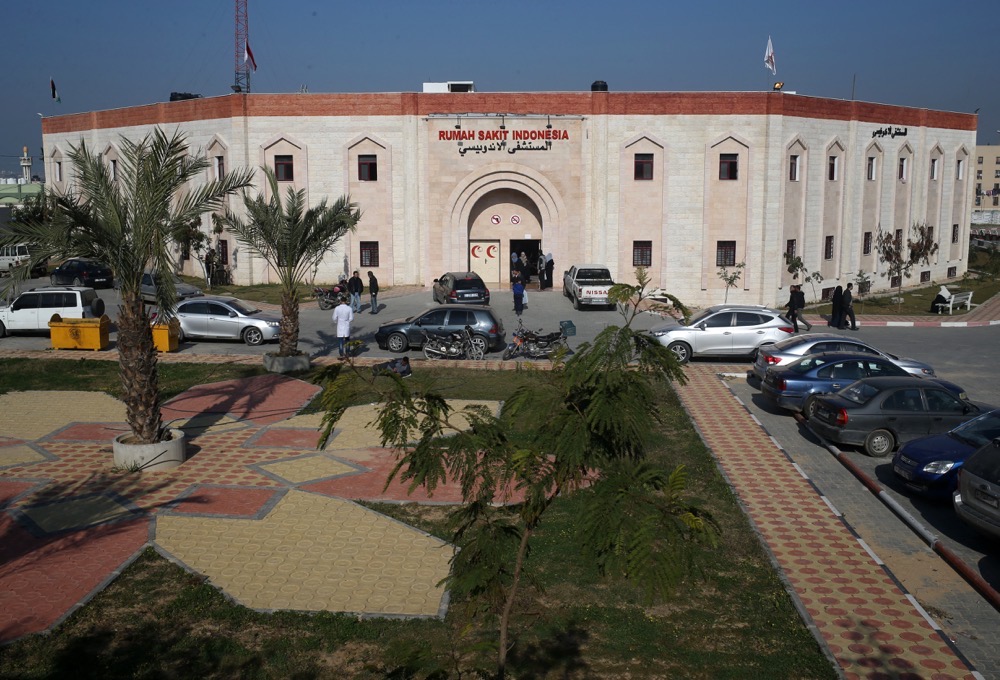
The hospital in 2016. (AFP/File)
Gaza’s Ministry of Health estimates that among the dead are 195 doctors, paramedics and nurses, who for the past two weeks have been increasingly targeted — alongside their relatives — despite medical workers being protected by the Geneva Convention.
For Indonesians, they are heroes.
“No one should risk their lives like that in saving others,” Berlian Idriansyah, a cardiologist in Jakarta, told Arab News.
“As a doctor, I’m astonished and heartbroken at the same time that Indonesian Hospital’s doctors and staff, and all health workers in Gaza, are determined to stay helping people until their last breaths.”
Paramita Mentari Kesuma, environmentalist and sustainability consultant, was deeply moved by their dedication.
“The doctors, the nurses, the medical staff in Gaza are our heroes,” she told Arab News.
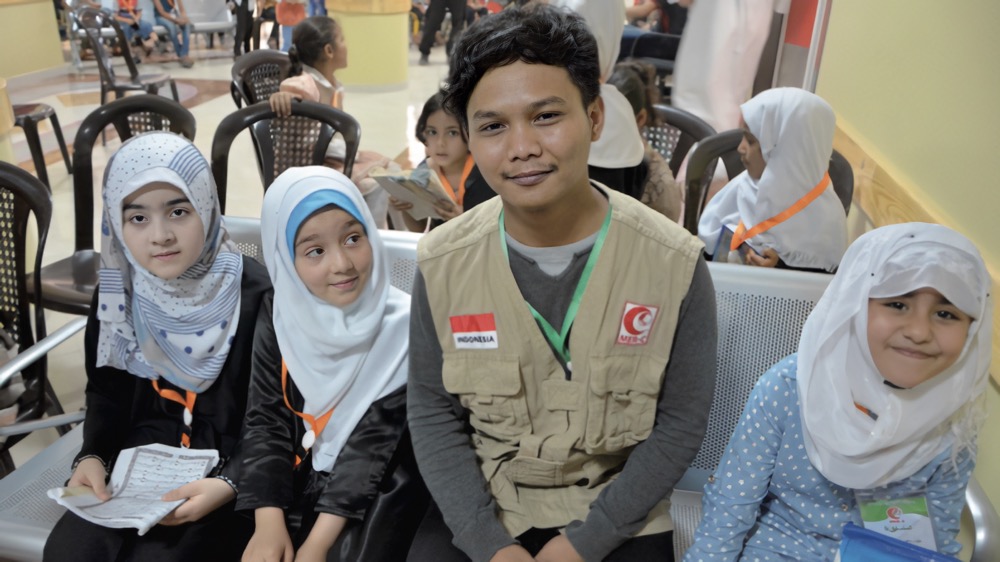
An Indonesian volunteer poses with Palestinian children during a competition to draw the building of the Indonesia Hospital in Gaza in 2015. (MER-C)
“We just cannot imagine the casualties and mental pressure that they experience there day by day … still saving lives, despite their own personal losses, and all that knowing that they might be the next target.”
Indonesia has long been a staunch supporter of Palestinians, who were among the first to recognize the Indonesian independence from Dutch colonial rule in 1945.
Many Indonesians see Palestinian statehood as mandated by their own constitution, which calls for the abolition of colonialism.
“The hospital represents this notion … The hospital represents Indonesia’s continuous support for the people of Palestine,” Kesuma said.
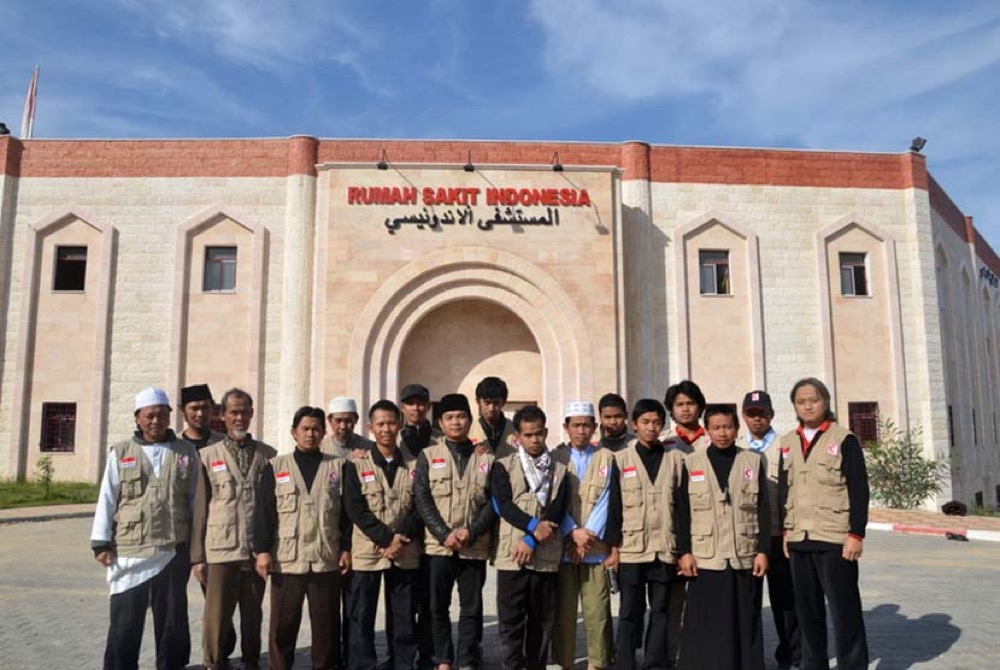
Many Indonesians see Palestinian statehood as mandated by their own constitution, which calls for the abolition of colonialism. (MER-C)
In the past few weeks that support has become especially important, as despite the cries from UN agencies, the Red Cross and Red Crescent, and human rights lawyers warning that Israel’s campaign of massacres in Gaza was beyond genocide, the world leaders have not stopped the daily and deadly strikes on civilians.
“When there is so little that we can do from our hometowns in Indonesia, we hope the hospital can also represent not only our voices but also all the voices from around the world that have been asking for a ceasefire,” Kesuma said.
“It serves as an extension of our prayers, presence.”
To Wanda Hamidah, Indonesian actress and politician, the hospital is also a representation of Indonesians, whose government, unlike the world’s most powerful countries, continued to be in solidarity with the Palestinians “as the methodical extermination campaign by Israel unfolded in their land.”
“As a mother and human, I am devasted by these massacres. For me, this is not war. This is ethnic cleansing, Holocaust,” she told Arab News. “What is painful is that these massacres are supported by the US and the European Union, to which we would look up to on human rights policies. But not anymore.”
The Indonesia Hospital has for her become a promise that Indonesians “will always be present and help the Palestinian state until Palestinians become independent again and back in control of their motherland.”
The sentiment of Indonesians “will never change,” she said, for it is a “manifestation of our love for Palestine.”
